Rugby union at the Summer Olympics
Rugby union has been a men's medal sport at the modern Summer Olympic Games, being played at four of the first seven competitions. The sport debuted at the 1900 Paris games where the gold medal was won by the host nation. It was subsequently featured at the London games in 1908, the Antwerp games in 1920 and the Paris games in 1924.
| Rugby union at the Summer Olympics | |
|---|---|
 | |
| Governing body | WR |
| Events | 2 (men: 1; women: 1) |
| Games | |
Shortly after the 1924 games, the International Olympic Committee (IOC) dropped rugby union as an Olympic sport. Since then there have been numerous attempts to bring the sport back to the Olympic programme. In October 2009 the IOC voted at its session in Copenhagen to include the sevens version of the sport in the 2016 Summer Olympics in Rio de Janeiro.[1] The event made its debut in an Olympic programme at the 2014 Summer Youth Olympics.
Inclusion
The sport was introduced by Pierre de Coubertin, who is famous for reviving the modern Olympics. He also helped to establish rugby in France, refereeing the first domestic French club championship in 1892 and France's first international, on New Year's Day, 1906, at Parc des Princes.[2][3] Coubertin formed the IOC in 1894, but rugby union was not featured until the II Olympiad.
1900
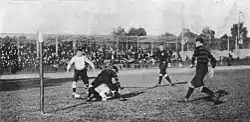
Three National Olympic Committees (NOCs), France, Germany and Great Britain, entered teams at the 1900 games. The German and British teams were not national teams in the current sense of the word: Moseley Wanderers RFC represented Great Britain and the FC 1880 Frankfurt represented Germany.[3] Rules were also different from today's; 3 points, not 5, were awarded for tries and 4, not 3, were given for a drop goal. Also, 4 points were awarded for a goal from mark, which would be reduced to 3 points in 1905 and eliminated completely in 1977. Points for penalties and conversions, 3 and 2 respectively, were the same as in the modern game.
France won the gold, beating Great Britain 27 points to 8 and defeating Germany 27 points to 17. Other sources list the German team as second, because of the points difference, but no such determination was made in 1900.[4] 6,000 people watched the game between France and Great Britain, which was the largest crowd at the games.[5] Constantin Henriquez, a player on the French team, is the first known coloured athlete to compete in the Olympic Games.[6]
1908
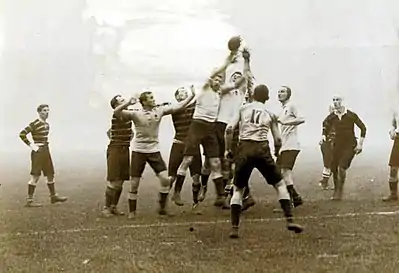
Rugby union was not played at the 1904 games in St. Louis, nor at the 1906 Intercalated Games, but was included in 1908, when the Olympics were held in the sport's native country. The Rugby Football Union (RFU) was involved in the organization of the sport at this edition of the Olympics. Like the 1900 games, three teams entered: Australasia (representing Australia and New Zealand), France, and hosts Great Britain (which included the whole of the United Kingdom of Great Britain and Ireland). France pulled out prior to the commencement of the tournament, being unable to field a representative team. Australasia was represented by the Wallabies, who were already on tour in Britain. As the best English and Welsh players were on tour in New Zealand at the time,[5] Great Britain was represented by the Cornwall county team,[7] who were chosen by the RFU as an appropriate side after they defeated Durham in the 1907 English county championship. The choice of Cornwall was controversial, as only three of their players had ever represented England and the Wallabies had defeated them 18 points to five.[8]
As expected, Australasia defeated Great Britain, claiming the gold medal, the score being 32 points to three. The match at the White City Stadium was played under poor conditions, in fog and on a slippery field.[9] Two of the Australian team members would later win another Olympic gold medal. Danny Carroll would win another rugby gold with the United States in 1920,[10] while Sydney Middleton would win a gold medal in rowing at the 1912 Games, where rugby was not on the programme.[11] The sport also failed to appear on the provisional schedule of the 1916 Summer Olympics, which were cancelled due to World War I.
1920
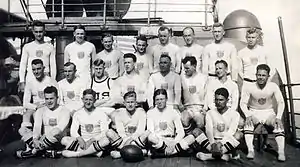
A campaign to send an American side to the 1920 games in Antwerp started in California after a Berkeley rugby union touring party returned from British Columbia undefeated in 1920.[8] The United States Olympic Committee (USOC) granted permission for entry. A pool of players from Stanford, Berkeley, and Santa Clara made up the squad.[8] 1908 champion Danny Carroll, a player-coach at Stanford at the time, was the team's most prominent member. When the U.S. arrived in Antwerp, the Czechoslovakian and Romanian teams had withdrawn, leaving only France and the United States. The English RFU had decided not to enter a team, so as not to interfere with the start of the English domestic season.[12]
The only match was played in rain in front of around 20,000 spectators. The U.S., featuring many players new to the sport of rugby, caused a shock by winning the only match eight points to zero, all points being scored in the second half. One of the U.S. team members, Morris Kirksey, took home two more medals from Antwerp, finishing second to Charles Paddock in the 100 meters dash, and anchoring the winning 4 × 100 meters relay team.[13]
1924
The sport was again included in the subsequent 1924 games in Paris. The USOC decided to send a team. Along with the U.S. and the host nation, Romania entered.[14] The American team was again made up of mainly Californian players. The U.S. squad departed on a seven-day voyage to England on an ocean liner from New York City.[14][15]
France defeated Romania 61 to 3[16] and entered the final game as favorites.[17] The gold medal game was played on 18 May in front of 30,000 spectators[18] at the Colombes venue.[19][20] The U.S. defeated France. At the final whistle the pitch was invaded by the French fans. The medal ceremony took place with police protection.
Rare vintage footage of the 1924 Gold Medal match was included in the rugby documentary, A Giant Awakens: the Rise of American Rugby.
Exclusion
The pitch invasion at the 1924 Paris Olympics had given rugby a poor image and this, together with the problems of attracting sufficient teams to make it a viable sport and the desire to include more individual and women's events, spelled the death knell for rugby at the Olympics.
Baron Pierre De Coubertin stepped down as head of the Olympic Movement after 1925 and with his departure the sport lost one of its major advocates.[3][14] In 1928 the IOC turned down a request to stage rugby at the Amsterdam games. An exhibition tournament was held at the 1936 Berlin Games, with France, Germany, Italy and Romania competing. In what was, to date, the last rugby match played at the Olympics, France beat Germany in the final 19 to 14.[12][21]
In 1976, 22 African countries and Guyana boycotted the 1976 Summer Olympics in Montreal, after their demand to have New Zealand excluded was not met. A New Zealand rugby team had toured South Africa, which had been banned from the Olympics since 1964 because of its apartheid politics. Rugby union not being an Olympic sport, the IOC declined to exclude New Zealand.[22]
Efforts for re-inclusion
Fifteens
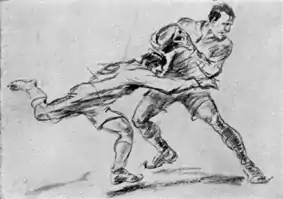
Italy in 1960, the Soviet Union in 1980, and South Korea in 1988 made requests to have rugby union brought back.[23] The 1980 request did not pass, and the 1988 games came close but failed to see the sport's admission, which was backed by the International Rugby Football Board (now, World Rugby (WR)).[3][16][24]
Apart from supporting the individual host cities' requests, the IRB did not focus its own efforts on returning the sport to the Olympics until the early 1990s, when efforts began to reunite the two movements with a series of informal meetings between the then IRB Secretary, Keith Rowlands, and the British Olympic Association Secretary, Dick Palmer. In 1994, when Vernon Pugh QC of Wales was elected Chairman of the IRB, the march towards Olympic recognition began in earnest. Pugh convinced the IRB Council that Olympic membership – initially as a non-participation sport – would be beneficial to rugby and offer the IRB member unions membership of their National Olympic Committees. Many European Federations, such as France, Italy and Romania, had been members of their National Olympic Committees for decades. The demand to get rugby back in the Olympics mounted as more rugby nations from Africa, Asia, Oceania and the Americas joined the IRB, because it was a sport seen as providing a realistic medal opportunity for a number of smaller nations.[25][26]
A significant step in the process of acceptance back into the Olympic Movement was achieved at a ceremony held in Cardiff in November 1994, when the IRB was officially confirmed as a Recognised International Federation of the IOC. At that ceremony, International Olympic Committee President, Juan Antonio Samaranch, pointed out that rugby's history and values were very much in tune with the Olympic philosophy and traditions. This historic meeting in Cardiff led to IRB representation at annual IOC meetings and consideration for inclusion in the programme of future Olympic Games.[27] In 2002, a plan was presented to induct rugby sevens, golf and the Chinese martial art of wushu.[24][28]
Sevens
- For further information, see Rugby sevens at the Summer Olympics#Efforts to include rugby sevens in the Olympics
Men
Results
| Year | Host | Gold medal game | Bronze medal game | ||||
|---|---|---|---|---|---|---|---|
| Gold | Score | Silver | Bronze | Score | 4th place | ||
| 1900 Details |
Paris |
France |
[29] | Germany Great Britain |
three nations entered | ||
| 1908 Details |
London |
Australasia |
32–3 | Great Britain |
two nations entered | ||
| 1920 Details |
Antwerp |
United States |
8–0 | France |
two nations entered | ||
| 1924 Details |
Paris |
United States |
17–3 | France |
Romania |
[30] | three nations entered |
Participating nations
| Nation | 00 | 08 | 20 | 24 | Years |
|---|---|---|---|---|---|
| – | – | – | |||
| – | |||||
| – | – | – | |||
| – | – | ||||
| – | – | – | |||
| – | – | ||||
| Total nations | 3 | 2 | 2 | 3 |
Medal table
| Rank | Nation | Gold | Silver | Bronze | Total |
|---|---|---|---|---|---|
| 1 | 2 | 0 | 0 | 2 | |
| 2 | 1 | 2 | 0 | 3 | |
| 3 | 1 | 0 | 0 | 1 | |
| 4 | 0 | 2 | 0 | 2 | |
| 5 | 0 | 1 | 0 | 1 | |
| 6 | 0 | 0 | 1 | 1 | |
| Totals (6 nations) | 4 | 5 | 1 | 10 | |
Updated: 1924 Summer Olympics
Notable rugby players involved in the Olympics
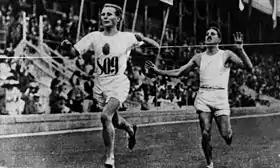
A number in other fields have also been notable rugby players, these include:
- Pierre de Coubertin, founder of the modern Olympics, was a rugby fan and referee of the first ever French championship rugby union final on 20 March 1892 between Racing Club de France and Stade Français.
- Jean Bouin, France and track events.
- Stan Harris
- Eric Liddell, Scotland and track events.
- Chris MacKintosh
- Heather Moyse, Canada and gold in Olympic bobsleigh.
- James Cecil Parke, Ireland and track events (also represented Ireland in cricket and golf, and as well as competing at Wimbledon and in the Davis Cup)
- Noel Purcell, Ireland and gold in Olympic water polo – the first Olympic athlete to represent two countries, Great Britain and the Irish Free State.
- David Robertson (golfer)
- Jacques Rogge, Belgium international and former IOC president.
- Constantin Henriquez, Haitian rugby player who won gold for France.
- Attie van Heerden
- Danny Crates, who has carried the torch twice at the Olympics, and is a notable Paralympian, also plays competitive rugby.
- Kevin O'Flanagan, Ireland international. Represented Ireland on the International Olympic Committee
- Victor Costello, who competed for Ireland in the shot put at the 1992 Games in Barcelona before winning 39 caps for the Ireland rugby union team.
Venues
| Games | City | Stadium | Capacity | Ref. |
|---|---|---|---|---|
| Paris | Vélodrome de Vincennes | not listed | [31] | |
| London | White City Stadium | 97,000 | [32] | |
| Antwerp | Olympisch Stadion | 12,771 | [33] | |
| Paris | Stade de Colombes | 22,737 | [34] | |
References
- "Golf & rugby voted into Olympics". BBC. 9 October 2009. Retrieved 4 January 2010.
- Mortimer, Gavin (5 February 2006). "Where les Anglais fear to tread". The Guardian. London. Retrieved 15 May 2006.
- "Rugby football in the Olympics". uk.geocities.com/moseleyfan. Archived from the original on 5 November 2005. Retrieved 15 May 2006.
- Mallon, Bill (1998). The 1900 Olympic Games – Results for All Competitors in All Events, with Commentary. McFarland. ISBN 0-7864-0378-0.
- "A short but eventful Olympic Rugby history". sportnetwork.net. Retrieved 21 May 2006.
- Wiggins, David Kenneth (2004). African Americans in sports. 1. Sharpe Reference. p. 264. ISBN 0-7656-8055-6.
- Barker, Philip. "Rugby World Cup Stirs Olympic Memories". British Olympic Association. Retrieved 26 October 2010.
- "Rugby at the Olympics". rugbyfootballhistory.com. Retrieved 15 May 2006.
- Mallon, Bill; Buchanan, Ian (2000). The 1908 Olympic Games – Results for All Competitors in All Events, with Commentary. McFarland. ISBN 0-7864-0598-8.
- Evans, Hilary; Gjerde, Arild; Heijmans, Jeroen; Mallon, Bill; et al. "Danny Carroll". Olympics at Sports-Reference.com. Sports Reference LLC. Archived from the original on 20 October 2012. Retrieved 2 March 2010.
- Evans, Hilary; Gjerde, Arild; Heijmans, Jeroen; Mallon, Bill; et al. "Syd Middleton". Olympics at Sports-Reference.com. Sports Reference LLC. Archived from the original on 22 February 2020. Retrieved 2 March 2010.
- Buchanan, Ian. "Rugby Football at the Olympic Games". Journal of Olympic History. 5 (1): 12–14.
- Evans, Hilary; Gjerde, Arild; Heijmans, Jeroen; Mallon, Bill; et al. "Morris Kirksey". Olympics at Sports-Reference.com. Sports Reference LLC. Archived from the original on 8 August 2011. Retrieved 2 March 2010.
- "7th International Post Graduate Seminar on Olympic Studies". sport.gov.gr. Archived from the original on 29 April 2008. Retrieved 15 May 2006.
- Jenkins, Mark. "An American Victory in Paris". wesclark.com. Retrieved 15 May 2006.
- "Rugby at the 1924 Olympics". wesclark.com. Retrieved 15 May 2006.
- "Olympic Club Rugby – A Legacy of Excellence". ocrugby.com. Archived from the original on 18 December 2008. Retrieved 21 May 2006.
- "Rugby Olympic Games 1924 France USA back". Frederic Humbert. Retrieved 21 October 2020.
- Comité Olympique Français (1924). Les Jeux De la VIIIe Olympiade Paris 1924, Rapport Officiel. Paris: Librairie De France.
- Coppo, Richard. "The History of Rugby in the Olympic Games". rugbymag.com. Archived from the original on 18 May 2006. Retrieved 21 May 2006.
- Laget, Serge. "Rugby: Olympic tackles and scrums". Olympic Review. 1991 (288/289): 510–513.
- "1976: African countries boycott Olympics". BBC News. 17 July 1976. Retrieved 2 March 2010.
- "The Game of Rugby in Rome?". Bulletin Du Comité International Olympique. 1956 (55): 55–56.
- "RUGBY SEVENS READY TO OFFER WORLD CUP TO OLYMPICS". rugby.com.au. Archived from the original on 25 August 2006. Retrieved 25 May 2006.
- "Help Get Rugby Back into the Olympic Games". irb.com. Archived from the original on 12 June 2009. Retrieved 2 March 2010.
- "Rogge voices Olympic rugby doubts". BBC Sport. 30 October 2007. Retrieved 2 March 2010.
- "RUGBY IN THE OLYMPICS: HISTORY". irb.com. Archived from the original on 10 August 2011. Retrieved 12 October 2009.
- Mackay, Duncan (12 June 2005). "Sevens captains hit back at 'joke' remark". The Guardian. London. Retrieved 9 May 2006.
- Only two games were contested, France played both Germany and Great Britain, the French winning both matches. This saw the gold go to France, and both Germany and Great Britain are credited with silver and no bronze awarded.
- United States beat the other two competitors in the Rugby tournament, winning the Gold.
- 1900 Summer Olympics official report. pp. 15-16. Accessed 14 November 2010. (in French)
- 1908 Summer Olympics official report. pp. 32-5, 40. Accessed 5 October 2010.
- Sports-reference.com 1920 Summer Olympics rugby union. Archived 7 October 2012 at the Wayback Machine
- 1924 Olympics official report. pp. 50-5, 96-7, 121, 152, 216, 222, 238, 248, 265, 318, 339, 375, 499, 503, 536. (in French)
External links
- Rugby & The Olympic Games on IRB.com
- Olympic Sports of the Past on olympic.org
- Petition to get Rugby back to the Olympics on olympic-rugby.org
- Guidelines on how to get rugby into the Olympics on UR7s.com
- on RugbySevensGold2016.com